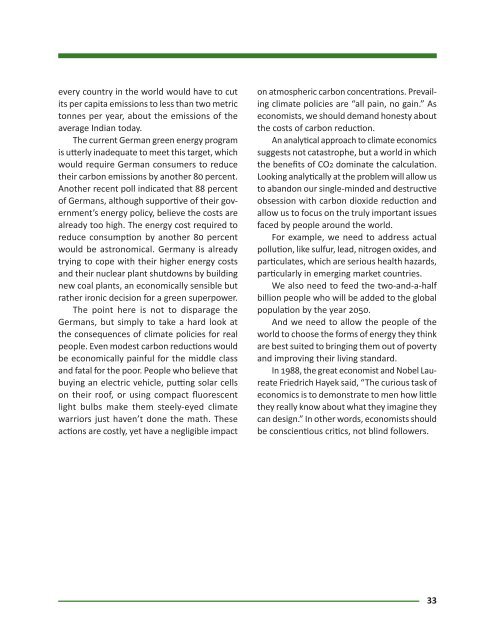The Climate Surprise
The-Climate-Surprise_CO2C-New-Criterion-1
The-Climate-Surprise_CO2C-New-Criterion-1
You also want an ePaper? Increase the reach of your titles
YUMPU automatically turns print PDFs into web optimized ePapers that Google loves.
every country in the world would have to cut<br />
its per capita emissions to less than two metric<br />
tonnes per year, about the emissions of the<br />
average Indian today.<br />
<strong>The</strong> current German green energy program<br />
is uerly inadequate to meet this target, which<br />
would require German consumers to reduce<br />
their carbon emissions by another percent.<br />
Another recent poll indicated that percent<br />
of Germans, although supporve of their government’s<br />
energy policy, believe the costs are<br />
already too high. <strong>The</strong> energy cost required to<br />
reduce consumpon by another percent<br />
would be astronomical. Germany is already<br />
trying to cope with their higher energy costs<br />
and their nuclear plant shutdowns by building<br />
new coal plants, an economically sensible but<br />
rather ironic decision for a green superpower.<br />
<strong>The</strong> point here is not to disparage the<br />
Germans, but simply to take a hard look at<br />
the consequences of climate policies for real<br />
people. Even modest carbon reducons would<br />
be economically painful for the middle class<br />
and fatal for the poor. People who believe that<br />
buying an electric vehicle, pung solar cells<br />
on their roof, or using compact fluorescent<br />
light bulbs make them steely-eyed climate<br />
warriors just haven’t done the math. <strong>The</strong>se<br />
acons are costly, yet have a negligible impact<br />
on atmospheric carbon concentraons. Prevailing<br />
climate policies are “all pain, no gain.” As<br />
economists, we should demand honesty about<br />
the costs of carbon reducon.<br />
An analycal approach to climate economics<br />
suggests not catastrophe, but a world in which<br />
the benefits of CO dominate the calculaon.<br />
Looking analycally at the problem will allow us<br />
to abandon our single-minded and destrucve<br />
obsession with carbon dioxide reducon and<br />
allow us to focus on the truly important issues<br />
faced by people around the world.<br />
For example, we need to address actual<br />
polluon, like sulfur, lead, nitrogen oxides, and<br />
parculates, which are serious health hazards,<br />
parcularly in emerging market countries.<br />
We also need to feed the two-and-a-half<br />
billion people who will be added to the global<br />
populaon by the year .<br />
And we need to allow the people of the<br />
world to choose the forms of energy they think<br />
are best suited to bringing them out of poverty<br />
and improving their living standard.<br />
In , the great economist and Nobel Laureate<br />
Friedrich Hayek said, “<strong>The</strong> curious task of<br />
economics is to demonstrate to men how lile<br />
they really know about what they imagine they<br />
can design.” In other words, economists should<br />
be conscienous crics, not blind followers.<br />
33


